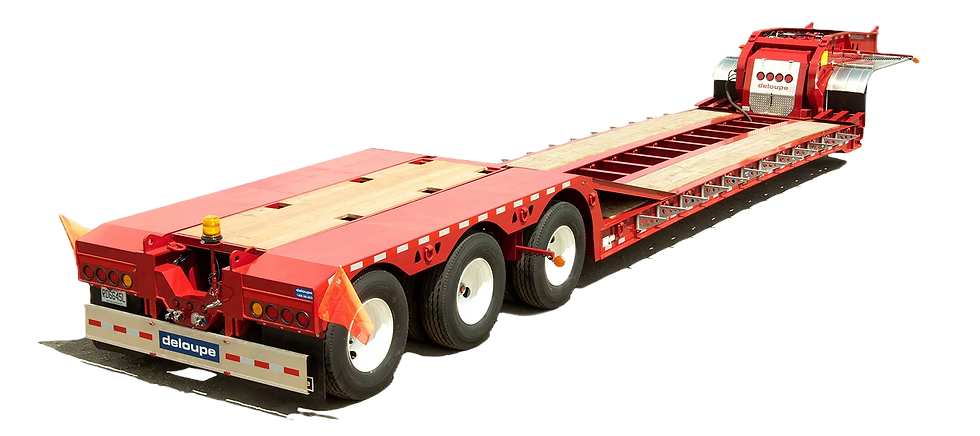Understanding the Advantages of Lowbed Trailers for Heavy Equipment Transport
- Roshan Raut
- May 15, 2025
- 4 min read
Transporting heavy equipment like excavators, cranes, and industrial machines requires specialized solutions to ensure safety and efficiency. One of the most effective tools for this task is the lowbed or lowboy trailer. These trailers are essential for moving oversized loads securely. In this post, we will explore the benefits of using lowbed trailers for heavy equipment transport and highlight why they are the go-to choice for industry professionals.
What is a Lowbed Trailer?
A lowbed trailer is a specialized type of trailer designed with a low platform height. This unique design allows for taller cargo clearance, making it ideal for transporting heavy equipment and oversized loads. The low platform minimizes the center of gravity, enhancing stability during transport. For instance, a lowbed trailer can typically lower its deck to as little as 18 inches from the ground, which is significantly lower than standard trailers.
These trailers serve various industries, including construction, mining, and agriculture. They can accommodate a wide variety of machinery, such as bulldozers and large agricultural equipment, making them indispensable in the heavy equipment transport sector.


Advantages of Using Lowbed Trailers
Safety and Stability
One of the primary advantages of lowbed trailers is their superior safety features. Their lower center of gravity provides improved stability compared to standard flatbed trailers. A study showed that transporting equipment with a lower center of gravity dramatically reduces the risk of tipping by up to 50%, especially for tall and heavy loads.
Furthermore, the design allows operators to load equipment directly onto the trailer without excessive height limitations, leading to more secure load placements. This design significantly enhances transport safety, preventing accidents and damage to valuable machinery.
Enhanced Loading and Unloading Process
Lowbed trailers streamline the loading and unloading of heavy equipment. Their low height allows easy access for cranes, forklifts, and other loading machinery. For example, operators can drive a 30,000-pound excavator directly onto a lowbed trailer without needing additional ramps. This process saves time and reduces the risk of damage to both the trailer and the transported equipment.
This efficiency leads to increased productivity. In industries where time is money, the ability to load and unload quickly can make a significant difference in operational costs.
Versatility in Cargo Transport
Lowbed trailers are designed to handle a wide range of cargo. They can transport various types of machinery, including excavators, cranes, and even industrial generators. Their versatility not only saves companies the expense of purchasing multiple types of trailers but also optimizes logistics.
For instance, a construction company can use a single lowbed trailer for transporting different types of heavy equipment to a site, rather than managing multiple trailers for specific types of machinery. This adaptability allows businesses to maximize their transport capabilities and enhance overall efficiency.
Regulatory Compliance
Transporting oversized or heavy loads often involves navigating strict regulations set by local and federal authorities. Lowbed trailers are specifically designed to meet many of these regulatory standards, including necessary height and weight restrictions. Compliance reduces the chances of fines, which can reach thousands of dollars, and helps ensure the safety of the load during transport.
Selecting a lowbed trailer that aligns with all regulatory requirements simplifies the logistics for businesses, allowing for a smoother and more efficient transport process.
Cost-Effectiveness
Investing in a lowbed trailer can provide a cost-effective solution for businesses involved in heavy equipment transport. While the initial purchase may be higher than standard trailers, the long-term savings in terms of time, safety, and versatility can be substantial.
For example, by reducing the likelihood of accidents or damage during transport, businesses can save thousands on repairs and insurance claims each year. This makes lowbed trailers a financially wise choice for heavy equipment operations.
Selecting the Right Lowbed Trailer
When considering a lowbed trailer for your transport needs, it's crucial to evaluate specific factors to ensure you select the right option.
Load Capacity
Different lowbed trailers come with various load capacities, typically ranging from 25,000 to over 100,000 pounds. Assess the weight of the equipment you plan to transport to choose a trailer that can handle it safely. Overloading can lead to serious accidents and equipment damage.
Length and Configuration
Lowbed trailers are available in multiple lengths and configurations. Evaluating the dimensions of your cargo is necessary to ensure the trailer provides adequate space. For instance, if your typical load includes a machine measuring 30 feet long, selecting a trailer that is at least 35 feet ensures secure transport.
Maintenance Tips for Lowbed Trailers
To keep your lowbed trailer in optimal condition, regular maintenance is key.
Regular Inspections
Routine inspections help identify any potential issues early. Check the tires, brakes, and overall structural integrity of the trailer to ensure safe transport. Aim for inspections every 6,000 miles, or sooner if transporting particularly heavy loads.
Cleaning and Rust Prevention
Cleaning your lowbed trailer after each use prevents rust and corrosion. Applying protective coatings can extend the trailer's lifespan and maintain its aesthetic appeal. This simple practice can help prevent costly repairs down the line.
Professional Servicing
Factory-trained professionals should perform regular servicing to ensure all components are functioning correctly. Having a qualified technician conduct maintenance checks can prevent unexpected breakdowns during transport, saving time and money.
Final Thoughts
Lowbed trailers offer numerous advantages for transporting heavy equipment. Their low platform height enhances safety, efficiency, and versatility while reducing operational costs. When selecting a lowbed trailer, consider crucial factors, such as load capacity and durability, to ensure it meets your needs.
As industries increasingly rely on heavy machinery for various applications, lowbed trailers will remain essential for ensuring safe and efficient transport solutions. By understanding their benefits and maintenance practices, businesses can optimize their transportation processes and enhance productivity.
Investing in a lowbed trailer can significantly improve your logistics and transportation efficiency, making it a valuable asset for anyone involved in the heavy equipment transport sector.



Comments